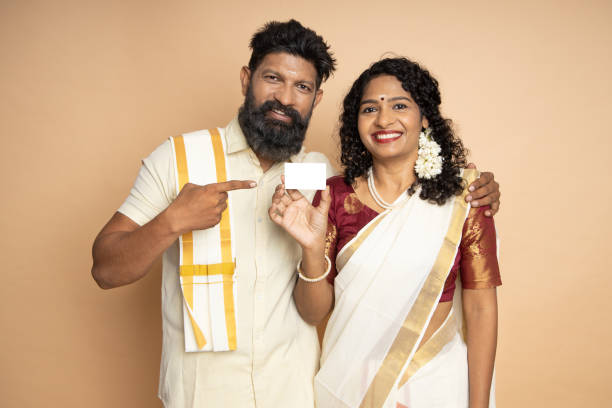Tamil Nadu, a prominent state in South India, is renowned for its rich cultural heritage and exquisite temples. The traditional dress of Tamil Nadu embodies its diverse culture and historical essence. With fabrics like silk, crepe silk, georgette, cotton, chiffon, pattola silk, organza and micro silk being commonly used, the attire showcases an impressive range of materials and craftsmanship. Let’s delve deeper into the traditional dresses of Tamil Nadu, exploring the distinctive outfits worn by both men and women.
Traditional Dresses of Tamil Women
Pavadais
Pavadais are traditional long skirts worn by young girls in Tamil Nadu. Made primarily from cotton, pavadais are paired with a short blouse, creating a comfortable and elegant ensemble. These skirts are typically worn during family gatherings, festivals and special occasions, symbolizing purity, simplicity and grace.
Kanchipuram Sarees
Sarees hold a significant place in Indian women’s attire, but the style and design can vary widely across regions. Kanchipuram sarees, a hallmark of Tamil Nadu, are renowned for their intricate handwoven designs and premium quality. These sarees, often made from silk, feature elaborate patterns and motifs, reflecting the rich craftsmanship of the region. They are traditionally worn during weddings, festivals and grand celebrations. Among these, the Madisar saree stands out, signifying married women and worn on auspicious occasions.
Salwar Kameez
The salwar kameez is a staple of daily wear in Tamil Nadu. This outfit consists of a long tunic (kameez) paired with loose-fitting pants (salwar) and a matching dupatta. The salwar kameez is versatile, suitable for both formal and casual settings, making it a popular choice for everyday wear.
Traditional Dresses of Tamil Men
Veshti (Lungi)
The veshti, also known as the lungi, is a traditional garment worn by men in South India. In Tamil Nadu, the veshti is typically white or cream with a golden border and is often paired with a shirt or kurta. Made from cotton, it offers comfort and breathability, making it ideal for casual wear and festive occasions.
Angavastra
The angavastra is a significant garment in Tamil culture, used during religious ceremonies and weddings. It is a long piece of cloth draped over the shoulders, adding a touch of grace and respect to the attire. The angavastra, made from cotton or silk, comes in various colors and patterns, symbolizing elegance and tradition. Recently, it has also been adapted to be worn over shirts, showcasing its versatility.
Silk Shirts
Silk shirts are a favorite among Tamil Nadu men for their luxurious feel and smooth texture. These shirts, available in both long and short sleeves, are crafted from high-quality silk and come in a variety of colors. They stand out from regular shirts in other Indian states due to their unique fabric and finish, making them a distinctive part of Tamil attire.
Traditional Accessories of Tamilian Women
No traditional outfit is complete without the addition of finely crafted jewelry. Tamilian women often adorn themselves with exquisite gold ornaments, which include:
Vanki
The vanki is a distinctive armlet worn by brides and dancers in Tamil Nadu. Crafted from silver or gold, it features intricate designs and gemstones. This piece of jewelry symbolizes feminine power and is considered a treasured heirloom passed down through generations.
Mangamalai
The mangamalai, or mango mala, is a traditional necklace featuring mango-shaped designs made from pure gold. The necklace is embellished with black beads and a mango-shaped pendant, symbolizing prosperity, charm and royal elegance.
Conclusion
The traditional dress of Tamil Nadu is deeply rooted in the state’s cultural heritage. These garments not only reflect the rich traditions but also showcase the craftsmanship and artistry that define Tamil Nadu. From the elegant Kanchipuram sarees to the versatile veshti and the intricate jewelry, each piece of traditional attire tells a story of the region’s vibrant history and cultural values. As Tamil Nadu continues to celebrate and preserve these traditional outfits, they remain a testament to the state’s enduring cultural legacy.



